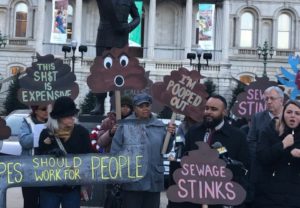
During a public hearing, the Baltimore Department of Public Works indicated they plan to lift restrictions for reimbursement and provide direct cleanup assistance to residents who experience sewage backups.
On Tuesday, July 28, concerned residents and local advocates called on the City to improve support for residents who experience expensive and health-hazardous basement sewage backups during a public hearing in the Land Use Committee.
At the hearing, the Department of Public Works (DPW) outlined new and proposed changes to its handling of sewage backups into peoples homes. Acting DPW Director Matthew Garbark described immediate changes to the Expedited Reimbursement Program that, when implemented, will make it easier for residents to navigate the program and receive the help they need: eliminating the requirement that residents must report sewage backups to 311 within 24 hours in order to qualify for the Expedited Reimbursement Program, and raising the reimbursement cap from $2,500 to $5,000.
Garbark also described the process DPW is undertaking to secure contracts for direct cleanup assistance for residents who experience backups. This is critical because many residents are currently cleaning up raw sewage in their basements themselves because they cannot afford professional cleaning services, which can cost tens of thousands of dollars. And since COVID-19 may be potentially transmitted through sewage, as well as many other pathogens and diseases, these backups are more dangerous now than ever before. Finally, DPW said they are working to expand the reimbursement program to apply to backups that occur in any weather conditions, not just wet weather.
Councilmember Kristerfer Burnett of Baltimore City’s District 8 said, “We have a long road ahead to finally ensuring residents no longer experience frequent residential sewage backups, however, I am encouraged to learn about upcoming improvements to the Department of Public Works Expedited Reimbursement Program. I’m thankful that the agency is incorporating feedback from environmental advocates and Baltimore residents into its response to this issue, and I look forward to continuing to work together to address this public health challenge.”
“It’s good to hear DPW is willing to adjust and take the right steps towards a more positive approach in facilitating the program,” said Sean Stinnett, president of the West Arlington Improvement Association. “However, many homeowners will be reluctant to reapply due to being previously denied. Nevertheless, community leaders and advocates along with DPW must aggressively educate and encourage residents to apply for reimbursement and utilize the direct cleanup assistance program.”
“It is critical that Baltimore City provide direct cleanup assistance to residents who face the public health hazard of sewage backups in their homes,” said Leah Kelly, Senior Attorney with the Environmental Integrity Project. “We are encouraged to hear that DPW is starting a program to provide this important service, which should be made available to all residents.”
“Once implemented, these changes will make the city’s handling of sewage backups significantly more helpful and equitable than it has been in the past,” said Jennifer Kunze, Maryland Program Manager with Clean Water Action. “Providing crews to clean up sewage backups as soon as possible, regardless of cause, at no cost to the building’s residents is absolutely necessary to protect public health in all communities. We look forward to learning more about how DPW plans to implement this program and to spreading the word that people will at last be able to get immediate help.”
“While we applaud the proposed changes DPW described during yesterday’s hearing, the data tells us that the City is still failing to adequately advertise this program. Even when people do apply, they face enormous barriers to approval,” said Alice Volpitta, Baltimore Harbor Waterkeeper with Blue Water Baltimore. “Baltimore deserves better. The Department of Public Works, Mayor, and City Council must ensure these promised improvements are made as quickly as possible and that residents have access to direct cleanup assistance.”
“The improvements announced by Baltimore are an important step forward, especially the dropping of the city’s bureaucratic requirement that residents report sewage floods in their basements within 24 hours to receive reimbursements for cleanup,” said Tom Pelton, spokesman for the Environmental Integrity Project. “The key question is now whether the city will actually follow through with this encouraging language and end its unjust past practice of denying help to more than 90 percent of residents who asked the city for help, regardless of the fact that many of the overflows were caused by the city’s own negligence. We need to see more residents receiving cleanup assistance from the city because sewage in people’s homes is such an obvious public health hazard.”
Background
Baltimore City is under a federal consent decree to reduce sewage overflows into waterways. But as the City works to close sewage outflow points into streams and the harbor, it’s putting more pressure on the sewer system. And for thousands of Baltimoreans, that means raw sewage backing up into their basements.
The public hearing can be viewed in full here: https://youtu.be/tiq-unGhJR8


